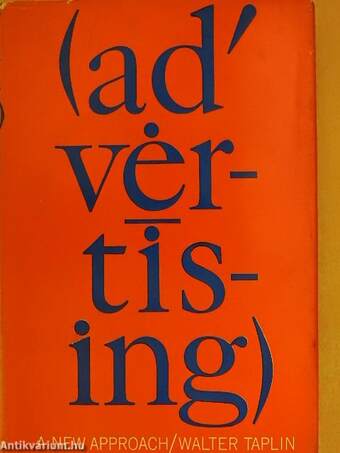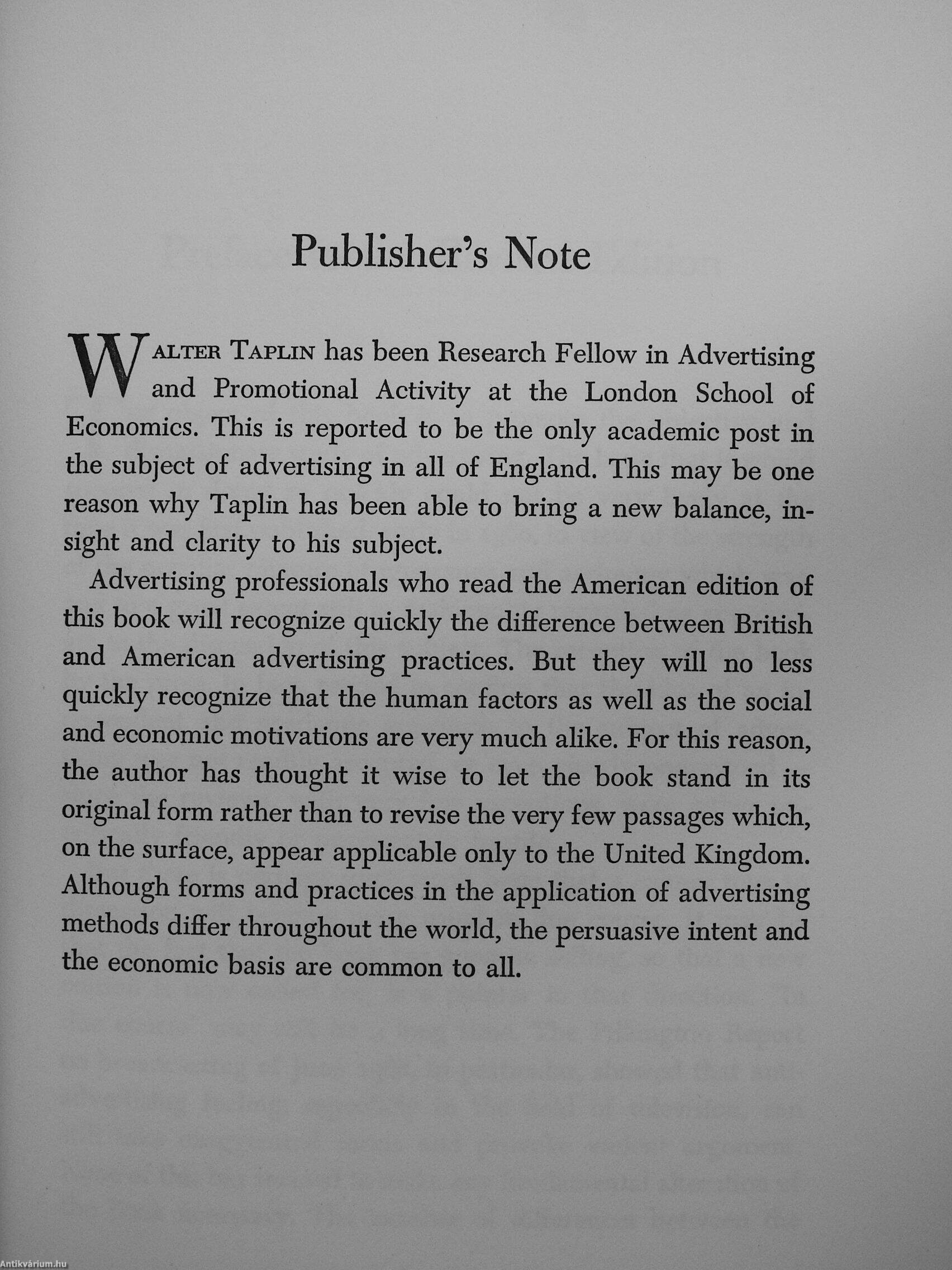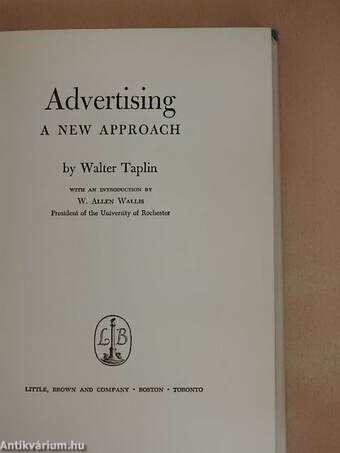1.066.319
kiadvánnyal nyújtjuk Magyarország legnagyobb antikvár könyv-kínálatát

VISSZA
A TETEJÉRE
JAVASLATOKÉszre-
vételek
Advertising
A New Approach
| Kiadó: | Little, Brown and Company |
|---|---|
| Kiadás helye: | Boston-Toronto |
| Kiadás éve: | |
| Kötés típusa: | Varrott keménykötés |
| Oldalszám: | 236 oldal |
| Sorozatcím: | |
| Kötetszám: | |
| Nyelv: | Angol |
| Méret: | 21 cm x 14 cm |
| ISBN: | |
| Megjegyzés: |
naponta értesítjük a beérkező friss
kiadványokról
naponta értesítjük a beérkező friss
kiadványokról
Előszó
TovábbFülszöveg
n
A:AINA ^f.UU
I
li I ; I. f '!.;
ADVERTISING — A NEW APPROACH is neither an apologia nor an attack, but it is something more important — a definition which tells both advertiser and consumer where he stands in relation to this massive feature of contemporary life. In the course of this provocative study, the author steps into the line of fire to take a hard look at some familiar verbal barrages:
"Advertising aims at the lowest common denominator."
"The only function of advertising is to convey information."
"Advertising doesn't give the consumers what they really want, but only what they think they want."
"Without advertising, sales would go down and prices would go up."
"Modern life tends more and more to take its character from advertisements."
"The advertising business is used as a scapegoat."
The books on advertising that now crowd the stalls tend toward two extremes. One approach depicts advertising as the painted harlot of mass culture, the debaser of us all. The... Tovább
Fülszöveg
n
A:AINA ^f.UU
I
li I ; I. f '!.;
ADVERTISING — A NEW APPROACH is neither an apologia nor an attack, but it is something more important — a definition which tells both advertiser and consumer where he stands in relation to this massive feature of contemporary life. In the course of this provocative study, the author steps into the line of fire to take a hard look at some familiar verbal barrages:
"Advertising aims at the lowest common denominator."
"The only function of advertising is to convey information."
"Advertising doesn't give the consumers what they really want, but only what they think they want."
"Without advertising, sales would go down and prices would go up."
"Modern life tends more and more to take its character from advertisements."
"The advertising business is used as a scapegoat."
The books on advertising that now crowd the stalls tend toward two extremes. One approach depicts advertising as the painted harlot of mass culture, the debaser of us all. The other extreme puts advertising in a Gleemkote suit of armor and strives to prove the dubious proposition that we would all revert to an agrarian torpor without its blessings. Walter Taplin's approach is to sweep aside all the brambles of prejudice and special pleading and to examine advertising for what it really is, what it strives to do, and how far it can and cannot affect our lives. ADVERTISING — A NEW APPROACH will stand for years to come as a clarifying classic.
(Continued on second flap)
I
I
(Continued from first flap)
The first half of this succinct volume examines the general ideas involved in advertising: the economic Causes, the nature of human Wants, the functions and limitations of Information, the arts of Persuasion both genuine and false. Then, after a bridging chapter on Competition, it goes on to aspects of the actual processes: Morals, Appropriations, Budgets, Agencies, and, finally. Technique.
Throughout, Walter Taplin asks for, and shiningly exemplifies, a spirit of open-minded inquiry. "All we can do," he says, "is to push on with the discussion of what happens, and hope that those who think they know it all already will consent to a voluntary suspension -of disbelief in their own fallibility."
Walter Taplin was educated at University College, Southampton, and Queen's College, Oxford, where he received an M.A. degree in 1957. During the war years Mr. Taplin served in the War Offices of the Cabinet and for a time was seconded to the Combined Chiefs of Staff in Washington — his first of many visits to the United States. Since that time he has been the Editor of Spectator, the Senior Economist to the Iron and Steel Board, and Research Fellow ' in Advertising and Promotional Activity in the London School of Economics — holding the only academic post in the subject of advertising in the entire United Kingdom. Mr. Taplin is the author of The Origin of Television Advertising and History of the British Steel Industry, , as well as numerous articles in the Economist, Spectator and other magazines.
Jacket design by Appelbaum and Curtis ' ,
"I am delighted that Walter Taplin's volume on Advertising is to be published in the United States. Its well-written pages provide a freshness of viewpoint and a keenness of analysis that should command the attention of all who have an interest in the economic, moral, and social consequences of advertising."
NEIL H. BORDEN Professor of Marketing Harvard Graduate School of Business Administration Vissza















